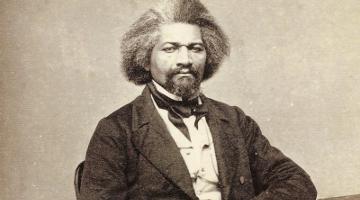“If you rightly condemn Washington and Jefferson as loathsome oppressors of humanity, you are then obligated to purge the nation and world of the poisoned fruit of their racist perversion.”
Trump and America’s Fascist Forefathers
by BAR executive editor Glen Ford
“Fascism, including the Nazi variety, is not some strange European social disease.”
Donald Trump was even more agitated and combative than usual at Tuesday’s press conference. How could he draw a line to separate the “neo-Nazis” and assorted “white supremacists” that had descended on Charlottesville, Virginia -- one of whom used his car to crush the life out of a young woman -- and the “very fine people” that favored keeping Robert E. Lee’s statue on its pedestal in (recently renamed) Emancipation Park? And, where would the racist-removal project end?
The answer, as somebody once said, was blowing in the wind. “So this week, it is Robert E. Lee,” warned Trump. “I noticed that Stonewall Jackson is coming down. I wonder, is it George Washington next week? And is it Thomas Jefferson the week after? You know, you really do have to ask yourself, where does it stop?”
There is nothing wrong with Trump’s logic. If the legacy of slavery is to be excised root and branch, then nothing less than the most profound social transformation is in order. Why stop with statues of long dead men? If you rightly condemn Washington and Jefferson as loathsome oppressors of humanity, you are then obligated to purge the nation and world of the poisoned fruit of their racist perversion.
What these forefathers “brought forth on this continent” was “a new nation, conceived” NOT in liberty, nor was it dedicated to the proposition that all men were created equal. According to Chief Justice Roger B. Taney’s Dred Scott decision, the United States was founded as a white man’s country in which “neither the class of persons who had been imported as slaves nor their descendants, whether they had become free or not, were then acknowledged as a part of the people, nor intended to be included in the general words used in that memorable instrument” (the Declaration of Independence).
“The super-profits of the slave production system had made the United States a global economic power.”
In 1857, when Taney made his ruling, the value of U.S. slaves was greater than every other national asset except the land within its borders -- land that was itself stolen from the indigenous peoples, and much of which would be valueless without slave labor. The super-profits of the slave production system had made the United States a global economic power, the second great industrial power on Earth -- right behind Britain, where U.S. slave-produced cotton was the engine of its globalizing juggernaut. Through ruthless exploitation of captive Black bodies, writes Edward Baptist in The Half Has Never Been Told: Slavery and the Making of American Capitalism, “the United States seized control of the world market for cotton, the key raw material of the Industrial Revolution, and became a wealthy nation of global influence.”
U.S. imperialism is rooted in the rapacious expansionism of the slave system. George Washington envisioned the new nation as a “rising empire.” Jefferson spoke of an “empire of liberty” -- meaning, the liberties he enjoyed from the labor (and sexual exploitation) of the slaves. White supremacy legitimized every avarice of the new nation. The Monroe Doctrine staked the exclusive U.S. claim to dominate the Western Hemisphere -- regarded as populated by inferior and “mongrel” races -- an “exceptionalism” Washington now insists extends to the entire planet.
“U.S. imperialism is rooted in the rapacious expansionism of the slave system.”
Fascism, including the Nazi variety, is not some strange European social disease. After crushing Black Reconstruction, the southern states invented, from the bottom up, the world’s first totally racially regimented society. U.S. “Jim Crow” inspired Adolph Hitler’s vision for nation-building under Aryan supremacy, as documented in James Q. Whitman’s recent book, Hitler’s American Model. American fascism predated -- and has long outlived -- the European variety. It is generally accepted that fascist states are characterized, to one degree or another, by:
- Extreme nationalism
- Frequent resort to mob rule
- Oppression of an internal “Other” as an organizing principle
- Militarism
- The political dominance of the most reactionary elements of the bourgeoisie
All of these characteristics describe the southern states of the U.S. during the nearly century-long period between the death of Reconstruction and the triumph of the Civil Rights Movement. Moreover, the post-Reconstruction reconciliation between North and South guaranteed that the southern fascism model would leave its imprint on the larger American political economy. In the aftermath of the Sixties, the Republican section of the corporate electoral duopoly assumed the role of the White Man’s Party -- the purer party of indigenous American fascism.
“American fascism predated -- and has long outlived -- the European variety.”
The Democratic Party, which founded this homegrown fascism, was now popularly identified as a haven for the nation’s racial and ethnic “Others.” However, the Democrats continued to pursue national reconciliation, as did the Republicans during the old Jim Crow. Even as the two parties were switching racial constituencies, they found common cause in imposing a “New” Jim Crow -- the mass Black incarceration regime that spread to all parts of the country with astounding speed at the close of the Sixties, and which is the most dramatic domestic expression of American fascism. The Democrats and Republicans are as close as “lips and teeth,” as the Chinese say, when it comes to U.S. imperialism. They both belong to the War Party, committed to unfettered U.S. expansion and endless warfare against the darker peoples of the world -- a national mission that began with Washington and Jefferson, and must be undone.
Donald Trump warned that, by knocking the icons off their pedestals, “You are changing history, you’re changing culture.”
Not quite – but it’s a small start.
BAR executive editor Glen Ford can be contacted at Glen.Ford@BlackAgendaReport.com.














